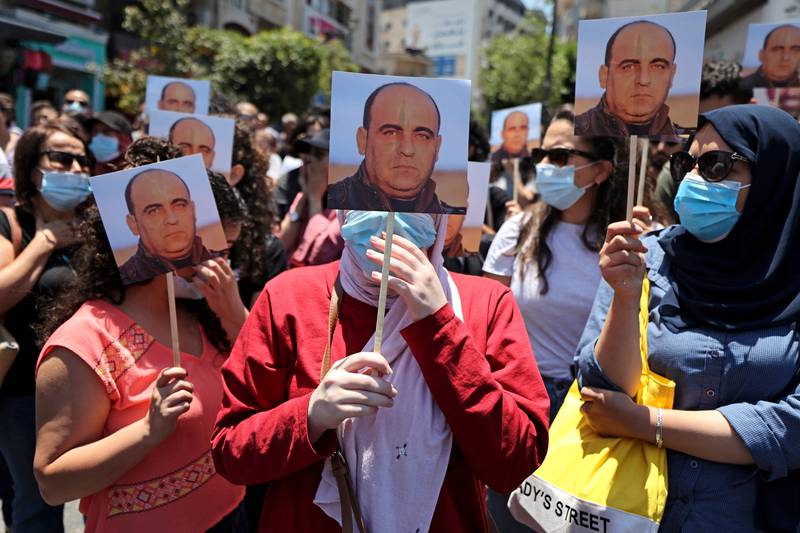The Palestinian Authority and its security agencies aren’t capable of repairing their contemptuous and alienated approach to their own people

Nizar Banat, a political activist who has been criticizing the Palestinian Authority for years, died Thursday shortly after he was arrested by Palestinian security forces. The thousands who demonstrated in the West Bank following his death claimed that it was a political assassination.
Actually, the lack of sophistication in his violent arrest suggests that the plan might not have been to kill him, certainly not at this stage, but only to warn him and others not to dare criticize the PA.
After all, the greater the loathing and repulsion for an unpopular authoritarian regime that won’t change, the more blatant that regime’s warnings and methods of deterrence. That is, Banat’s arrest and the violence were planned and calculated, but not the result: his death.
The security forces’ lack of restraint indicates that Banat had long been marked as a pain in the neck. The Palestinian security forces – controlled by powerful people in the Fatah movement – are the backbone of the PA and President Mahmoud Abbas’ government.
They don’t protect their people from the settlers’ attacks and the Israeli army’s invasions. Instead, they ensure the PA’s existence and the comfort in which the top civil servants and politicians, the nomenklatura, live despite the criticism and their political failures, and despite Israel’s ongoing oppression of land grabs facilitated by the security coordination with the PA.
Banat was arrested before dawn Thursday not in his home in the city of Dura but in his cousins’ house in Hebron in H2, the part of Hebron under Israeli security control. In this part of town the Palestinian security forces must ask the Israelis for permission to make arrests and to coordinate the entrance of armed personnel with the Israeli army and Israel’s Coordinator of Government Activities in the Territories.
Banat considered himself recently as “wanted” by the PA, a friend of his who lives in Dura told Haaretz. He said Banat had moved to H2 temporarily. On May 2 shots and stun grenades were fired at his house in Dura. His house is near the courthouse, so there’s no shortage of Palestinian security guards in the area.
Presumably whoever fired at Banat’s home felt protected and confident. Banat had four children, the youngest 4 months old. He took this as a warning. Apparently he hoped the Palestinian security forces wouldn’t bother arresting him in H2, or would have a hard time obtaining Israel’s permission to do so. He was wrong.
The shooting followed bitter verbal clashes between Fatah and PA members and Banat, because he dared to criticize them for the security coordination with Israel, the corruption and nepotism, and for what he saw as personal interests being put before the good of the people.
In recent days he focused on the canceled deal in which Israel would have given the PA Pfizer-BioNTech vaccines that were about to expire, in exchange for fresh vaccines that Israel was supposed to get early next year and were originally intended for the Palestinian territory. Like many Palestinians, Banat found it hard to believe that senior figures’ personal financial interests weren’t behind this clumsy deal. The lack of transparency only strengthened their suspicions.
The Palestinian public’s abhorrence for the PA, its senior officials and their modus operandi and performance keep bubbling under the surface. Occasionally they burst out in demonstrations, and they’re reflected in random conversations and on social-media posts. Presumably most people choose their words carefully because the PA’s security branches arrest people for such statements.
Banat wasn’t careful. On videos of himself he posted on Facebook, the loathing, repugnance and anger were clear on his face, in his words and in the way he uttered them. Undeterred by arrests and warnings, he continued lashing out at the PA.
In November he was arrested and put on trial after lambasting Civil Affairs Minister Hussein al-Sheikh – the counterpart of Israel’s Coordinator of Government Activities in the Territories – and the PA for resuming security coordination with Israel. But the Palestinian court released him.
Banat, who worked as a painter and decorator, didn’t stop bashing the PA even after the May 2 shooting. He was a candidate on the Freedom and Dignity party that planned to run in the May 22 election that Abbas canceled. The preparations for the vote and the cancellation provided more opportunities for criticism.
According to testimonies collected Thursday by the Palestinian Center for Human Rights, at about 3 A.M. the window on the ground floor of Majdi Banat’s apartment building in Hebron was broken. Nizar Banat and his relatives Mohammed and Hussein, Majdi’s sons, were sleeping in the room. Two armed men in civilian clothes came in through the window and pepper-sprayed everyone in the room. One of the two opened the room’s door and more security men came in, including three whose clothes were inscribed with the words “Palestinian Preventive Security.”
The family members estimated that 20 security officers took part in the arrest. After spraying them with pepper spray, a few of them beat Banat with batons. One also hit Banat on the head with a metal bar, while others aimed their guns at the brothers Hussein and Mohammed and prevented them from intervening. About seven minutes later the security officers dragged Banat away, in his underwear, and beat him as he screamed in agony, the family members say.
The security men confiscated Banat’s phone and laptop; about an hour later came the announcement of his death at Hebron Governmental Hospital. His death sent shock waves and stirred protests – both virtual and physical. The PA announced it was setting up a government commission of inquiry, but it appears that both the PA and its security agencies aren’t capable of repairing their contemptuous and alienated approach to their people, who live under the burden of the Israeli occupation.
